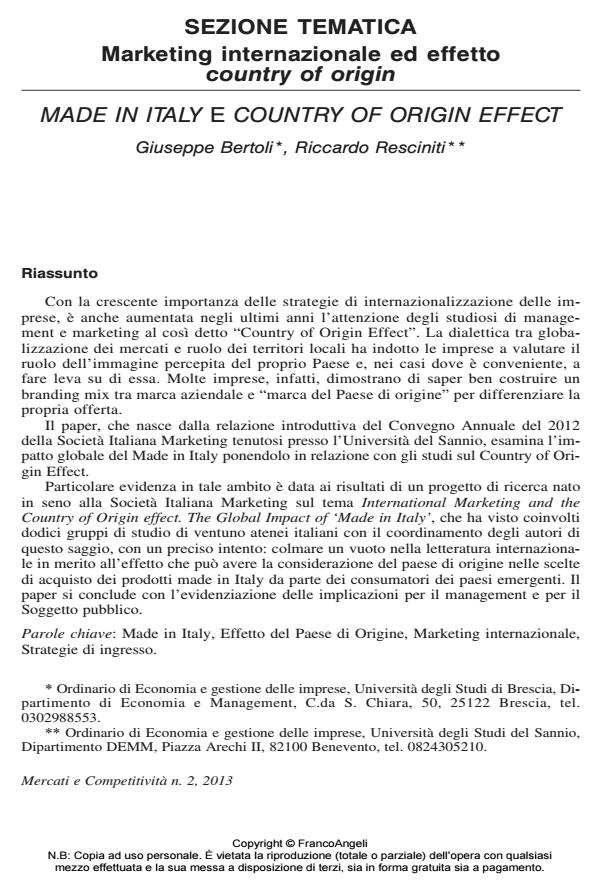Made in Italy and Country of Origin Effect
Journal title MERCATI & COMPETITIVITÀ
Author/s Giuseppe Bertoli, Riccardo Resciniti
Publishing Year 2013 Issue 2013/2
Language Italian Pages 24 P. 13-36 File size 745 KB
DOI 10.3280/MC2013-002002
DOI is like a bar code for intellectual property: to have more infomation
click here
Below, you can see the article first page
If you want to buy this article in PDF format, you can do it, following the instructions to buy download credits

FrancoAngeli is member of Publishers International Linking Association, Inc (PILA), a not-for-profit association which run the CrossRef service enabling links to and from online scholarly content.
The attention of management and marketing scholars for the so-called "Country of Origin Effect" has increased in recent years thanks to the growing importance of internationalization strategies. The dialectic between globalization of markets and the role of local territories has prompted companies to evaluate the role of the perceived image of their country and to use it when convenient. Many companies, in fact, demonstrate to be able to build a branding mix between company brand and country brand in order to differentiate their product offering. The paper, deriving from the introductory speech at the 2012 Annual Conference of Società Italiana Marketing that took place in the University of Sannio, analyzes the global impact of Made in Italy in relation to the studies on Country of Origin Effect. Particular emphasis in this regard is given to the results of a research project born within Società Italiana Marketing on the topic "International Marketing and the Country of Origin effect. The Global Impact of ‘Made in Italy", involving twelve study groups from twenty one Italian Universities under the supervision of the authors of this paper, with a specific intent: bridging the gap in the international literature in order to better understand the Country of Origin Effect on purchase intention of Made in Italy products of consumers from emerging countries. Finally the paper outlines the implications for managers as well as policy makers.
Keywords: Made in Italy, Country of Origin Effect, International Marketing, Entry Strategies
- Principles of reshoring development in luxury goods sector1
Michał Młody, Beata Stępień, in International Journal of Management and Economics /2020 pp.140
DOI: 10.2478/ijme-2020-0011 - English and other languages in Italian advertising Paola Vettorel, Valeria Franceschi, in World Englishes /2019 pp.417
DOI: 10.1111/weng.12432 - Effects of cultural distance on foreign acquisitions: evidence from italian acquired firms Michela Matarazzo, Gabriele Barbaresco, Resciniti Riccardo, in MERCATI & COMPETITIVITÀ 3/2016 pp.159
DOI: 10.3280/MC2016-003009 - Italian Food? Sounds Good! Made in Italy and Italian Sounding Effects on Food Products' Assessment by Consumers Flavia Bonaiuto, Stefano De Dominicis, Uberta Ganucci Cancellieri, William D. Crano, Jianhong Ma, Marino Bonaiuto, in Frontiers in Psychology 581492/2021
DOI: 10.3389/fpsyg.2021.581492 - Corporate museums as heritage vehicles: A comparative analysis between family and non-family businesses Mara Cerquetti, Marta Maria Montella, Domenico Sardanelli, in CORPORATE GOVERNANCE AND RESEARCH & DEVELOPMENT STUDIES 2/2023 pp.65
DOI: 10.3280/cgrds2-2022oa13773 - Le imprese italiane dell'industria agro-alimentare: mercati internazionali, relazioni di canale e strategie e politiche di branding Tiziano Bursi, Giovanna Galli, in MERCATI & COMPETITIVITÀ 2/2015 pp.15
DOI: 10.3280/MC2015-002002 - Curiosity as Brazilian tourist motivation in visiting Europe Maria Vincenza Ciasullo, Roberto Tommasetti, Orlando Troisi, Massimiliano Vesci, in Revista Brasileira de Pesquisa em Turismo /2019 pp.140
DOI: 10.7784/rbtur.v13i3.1596 - R&D internationalization in asian developing countries: evidence from european multinationals Stefano Bresciani, Alberto Ferraris, Manlio Del Giudice, in MERCATI & COMPETITIVITÀ 3/2016 pp.25
DOI: 10.3280/MC2016-003003 - Marketing in Culturally Distant Countries Giovanna Magnani, pp.93 (ISBN:978-3-031-04831-9)
- The role of language in international trade and the “made in Italy” Amir Maghssudipour, Marco Bellandi, Annalisa Caloffi, in Journal of Industrial and Business Economics /2023 pp.677
DOI: 10.1007/s40812-022-00238-w - Introduction. New frontiers for competition: Outcomes from the 13th CIRCLE International conference Enrico Bonetti, Michele Simoni, in MERCATI & COMPETITIVITÀ 1/2017 pp.15
DOI: 10.3280/MC2017-001002 - Business Models and ICT Technologies for the Fashion Supply Chain Valentina Mazzoli, Diletta Acuti, Lorenzo Magherini, Romeo Bandinelli, Raffaele Donvito, Dinorá Eliete Floriani, pp.37 (ISBN:978-3-319-98037-9)
- Le imprese del Nord Est alla conquista dei mercati emergenti Guido Bortoluzzi, Marina Chiarvesio, Raffaella Tabacco, in ECONOMIA E SOCIETÀ REGIONALE 2/2014 pp.31
DOI: 10.3280/ES2014-002003 - Consumer boycott of companies implementing offshoring strategies Silvia Grappi, in MERCATI E COMPETITIVITÀ 3/2015 pp.123
DOI: 10.3280/MC2015-003007 - How Are Destination Image and Travel Intention Influenced by Misleading Media Coverage? Consequences of COVID-19 Outbreak in China Shaohua Yang, Salmi Mohd Isa, T. Ramayah, in Vision: The Journal of Business Perspective /2022 pp.80
DOI: 10.1177/0972262921993245 - Two faces of the same coin: how the interplay between organizational and territorial culture builds the concept of service culture Laura I.M. Colm, Antonella Carù, in MERCATI & COMPETITIVITÀ 3/2016 pp.87
DOI: 10.3280/MC2016-003006
Giuseppe Bertoli, Riccardo Resciniti, Made in Italy e country of origin effect in "MERCATI & COMPETITIVITÀ" 2/2013, pp 13-36, DOI: 10.3280/MC2013-002002